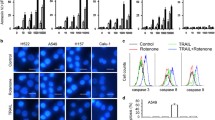Summary
Whether inhibiting the activity of nuclear factor (NF)-κB potentiates cisplatin-induced apoptosis in non-small cell lung cell line A549 cells was investigated. The recombinant plasmid pcDNA3.1 (+)/IκBα expressing IκBα was constructed. The in vitro cultured A549 cells were transfected with pcDNA3.1 (+)/IκBα alone, or pcDNA3.1 (+)/IκBα combined with cisplatin. The mitochondrial membrane potential (Δψm) was determined by rhodamine 123, the activity of caspase-3 was tested by colorimetric assay, and cell apoptosis was detected by flow cytometry with the annexin V /propidium iodide assay. The results showed that the activity of NF-κB in A549 cells was inhibited by transfecting pcDNA3.1(+)/I. Transfection of pcDNA3.1(+)/I alone did not promote apoptosis. Treatment of cisplatin alone had a little effect on cell apoptosis. Transfection of pcDNA3.1(+)/I combined with cisplatin treatment significantly induced apoptosis of A549 cells. It was concluded that inhibiting the activity of NF-B potentiated cisplatin-induced apoptosis of A549 cells.
Similar content being viewed by others
References
Spigel D R, Greco F A. Chemotherapy in metastatic and locally advanced non-small cell lung cancer. Semin Surg Oncol, 2003,21:98–110
Siddik Z H. Cisplatin: mode of cytotoxic action and molecular basis of resistance. Oncogene, 2003,22:7265–7279
Leclercq I A, Farrell G C, Sempoux C et al. Curcumin inhibits NF-κB activation and reduces the severity of experimental steatohepatitis in mice. J Hepatol, 2004,41:926–934
Jin X H, Ohqami K, Shiratori K et al. Inhibition of nuclear factor-kappa B activation attenuates hydrogen peroxide-induced cytotoxicity in human lens epithelial cells. Br J Ophthalmol, 2007,91:369–371
Pan Q, Bao L W, Merajver S D. Tetrathiomolybdate inhibits angiogenesis and metastasis through suppression of the NF-κB signaling cascade. Mol Cancer Res, 2003,1:701–706
Chaturvedi M M, Mukhopadhyay A, Aggarwal B B. Assay for redox-sensitive transcription factor. Methods Enzymol, 2000,319:585–602
Wang X. The expanding role of mitochondria in apoptosis. Genes Dev, 2001,15:2922–2933
Barkett M, Gilmore T D. Control of apoptosis by Re1/NF-kappaB transcription factors. Oncogene, 1999,18:6910–6924
Wang C Y, Mayo M W, Korneluk R G et al. NF-kappaB antiapoptosis: induction of TRAF1 and TRAF2 and c-IAP1 and c-IAP2 to suppress caspase-8 activation. Science, 1998,281:1680–1683
Chen Q M, Tu V C. Apoptosis and heart failure: mechanisms and therapeutic implications. Am J Cardiovasc Drugs, 2002,2:43–57
Lee J U, Hosotani R, Wada M et al. Role of Bcl-2 family proteins (Bax, Bcl-2 and Bcl-X) on cellular susceptibility to radiation in pancreatic cancer cells. Eur J Cancer, 1999,35:1374–1380
Suzuki A, Kawabata T, Kato M. Necessity of interleukin-1β converting enzyme cascade in taxotere-initiated death signaling. Eur J Pharmacol, 1998,343:87–92
Kottke T J, Blajeski A L, Martins M et al. Comparison of paclitaxel-, 5-fluoro-2′-deoxyuridine-, and epidermal growth factor (EGF)-induced apoptosis. J Biol Chem, 1999,274:15 927–15 936
Bellarosa D, Ciucci A, Bullo A et al. Apoptotic events in a human ovarian cancer cell line exposed to anthracyclines. J Pharmacol Exp Ther, 2001,296:276–283
Cai Z, Korner M, Tarantino N. IκBα overexpression in human breast carcinoma MCF7 cells inhibits nuclear factor-κB but not tumor necrosis factor-α induced apoptosis. J Biol Chem, 1997,272:96–101
Bargou R C, Emmerich F, Krappmann D et al. Constitutive nuclear factor-κB-Rel A activation is required for proliferation and survival of Hodgkin’s disease tumor cells. J Clin Invest, 1997,100:2961–2969
Wu M, Lee H, Bellas R E et al. Inhibition of NF-κB/Rel induces apoptosis of murine B cells. EMBO J, 1996, 15:4682–4690
Li Y, Ahmed F, Ali S et al. Inactivation of nuclear factor-κB by soy isoflavone genistein contributes to increased apoptosis induced by chemotherapeutic agents in human cancer cells. Cancer Research, 2005,65:6934–6942
Sen S, Sharma H, Singh N. Curcumin enhances Vinorelbine mediated apoptosis in NSCLC cells by the mitochondrial pathway. Biochem Biophys Res Commun, 2005,331:1245–1252
Author information
Authors and Affiliations
Rights and permissions
About this article
Cite this article
Zhang, J., Xu, Y., Xiong, W. et al. Inhibitory activity of nuclear factor-κB potentiates cisplatin-induced apoptosis in A549 cells. J. Huazhong Univ. Sci. Technol. [Med. Sci.] 28, 251–256 (2008). https://doi.org/10.1007/s11596-008-0305-4
Received:
Published:
Issue Date:
DOI: https://doi.org/10.1007/s11596-008-0305-4




